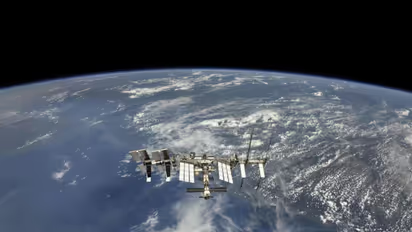Russia's anti-satellite missile test debris endangering ISS, posing long-term threat to space activity: NASA

Synopsis
NASA Administrator Bill Nelson in a statement said the agency would continue to monitor the debris in the coming days and beyond to guarantee the safety of our crew in orbit.
An anti-satellite missile test performed by Russia created a debris field in low-Earth orbit, endangering the International Space Station and posing a long-term threat to space activity.
The seven-member space station crew - four American astronauts, one German astronaut, and two Russian cosmonauts - were told to stay in their docked spacecraft capsules for two hours following the test as a precaution to enable for a speedy escape if necessary, according to NASA.
Still, NASA specialists judged it was safe for the crew to return to the station's interior following the third pass, the agency said. According to NASA, the crew was also instructed to temporarily close doors to numerous modules of the International Space Station (ISS). NASA Administrator Bill Nelson in a statement said the agency would continue to monitor the debris in the coming days and beyond to guarantee the safety of our crew in orbit.
According to experts, testing weapons that shatter satellites in orbit creates clouds of shards that can crash with other objects, triggering a chain reaction of projectiles through Earth orbit. The Russian space agency Roscosmos minimised the threat in a message issued on Twitter. In a statement, the agency said that the object's orbit that caused the crew following spacecraft today, in accordance with routine protocols, had moved away from the ISS orbit.
Also Read | Lunar Eclipse 2021: Date, time, where and when to watch; details inside
The Russian direct-ascent anti-satellite missile launched against one of its satellites caused more than 1,500 pieces of "trackable orbital debris" and will likely spawn hundreds of thousands of smaller bits, according to a statement from the US Space Command. The missile test debris "will continue to pose a hazard to activities in outer space for years to come, putting satellites and space missions at risk and requiring further collision avoidance manoeuvres," it warned.
The missile test was called "reckless and irresponsible" by US Secretary of State Antony Blinken. According to Pentagon spokesperson John Kirby, the exercise demonstrated the need to establish space conduct guidelines. He said that the debris cloud posed a threat to a second Chinese space station in the works and the three-person crew of "taikonauts" aboard that outpost. The incident happened just four days after the most current set of four space station astronauts arrived to begin a six-month scientific mission.
Also Read | NASA postpones Moon landing to 2025; All about it
Russia is not the first country to perform space anti-satellite testing. The United States accomplished the first in 1959 when satellites were uncommon and new. In April, Russia conducted another anti-satellite missile test as officials have stated that space would become an increasingly crucial area for warfare.